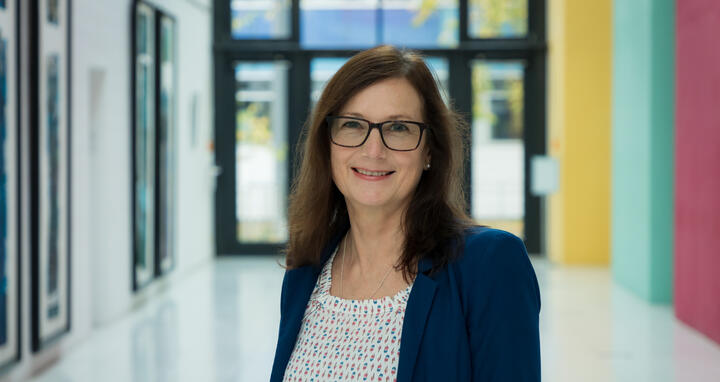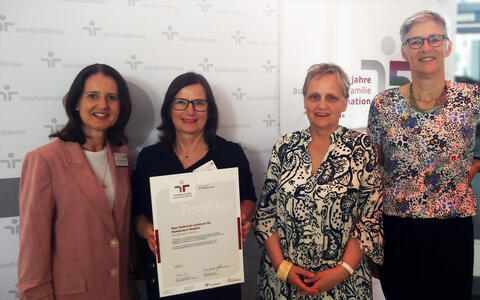Always striving to get better
Petra Nibbe is passionate about human resource. Petra Nibbe has been heading the Max Delbrück Center's "People and Culture" department since October 2022. A trained bookseller and business lawyer, she has been the Human Resources Manager at the Heinrich Böll Foundation for the twelve years. At the Max Delbrück Center, she now wants to help retain staff and attract new employees at times when specialists are scarce. In an interview, she explains how this is to be achieved.
What attracts you to science?
Petra Nibbe: Science requires a lot of freedom. In my view, it is really exciting to find ways to enable free work in a public institution with its sometimes narrow guidelines.
How do you get started?
Step by step. The HR department used to consist of five sub-departments, which have been merged into three teams: Human Resources and Organizational Development, Human Resources Controlling, and Human Resources Services. Together, these three teams now form the People and Culture department. We are currently analyzing the processes in the teams and in the organization in order to standardize procedures and avoid duplication of work. This is a valuable contribution to professionalization.
Can you give us an example?
Inquiries from scientists about their contracts were often handled and answered by two different teams, sometimes even differently. By clarifying responsibilities and improving cooperation and coordination, also between the teams, much has already changed and duplication is avoided.
Strengthening the image
What are the other key areas of your work?
We must continue to succeed in attracting and retaining qualified staff, given the shortage of skilled workers. Next year, 30 per cent of Berlin's civil servants are expected to retire. This means that this administration will also be looking for skilled workers. That's huge competition. We don't just need scientists. We also need people in the "engine room" of our administration who can support the researchers. With this in mind, we are working hard to strengthen our brand as an employer.
How can we achieve this?
The Max Delbrück Center is already very attractive. But that doesn't mean we can't do better. The texts of our job advertisements are very long and needs to be revised, and the way we address trainees may not always be entirely appropriate for young people. Above all, however, we need to create attractive working conditions that meet the needs of our employees. To find out what they want, we will be conducting more surveys in the future.
Flexibility is a top priority
What do employees want?
Flexibility, including the option to work remotely. Since 2021, there has been an agreement that allows employees to work from home twice a week in consultation with their supervisors. On the other hand, they would like to be able to adapt their working hours to different stages of their life – for example, to reduce their working hours to 50 percent for two years after the birth of a child and then increase them again. That's what we encourage.
This year, the Max Delbrück Center was awarded the "berufundfamilie" (Job and family) certificate for the fifth time. Does this certificate contribute to the center's appeal?
It's impossible to say, because we don't know exactly what motivates our applicants. I think the certificate shows that we do a lot for our employees. For us, it is also an incentive to keep moving forward. The Max Delbrück Center is a very busy place, and there are many dedicated colleagues who work in groups on various topics such as the “work and family” audit but also on sustainability or diversity and inclusion. At the end of the day, these topics cannot be considered in isolation from each another. For example, the diversity team has worked to ensure that we have rooms for mothers who want to return to work but still breastfeed their child. This, in turn, contributes to both the issue of promoting women and our family-friendliness in general – and thus to the "work and family" certificate.
They received the certificate for the Max Delbrück Center: Heike Graßmann, Administrative Director, Petra Nibbe, Head of People & Culture, Gabriele Kollinger, Team Personnel and Organizational Development, and Women's Representative Christiane Nolte.
"Top-down management no longer works"
What is currently planned?
The new leadership guidelines are to be translated into concrete actions, such as training for supervisors. Good leadership means keeping people engaged. Top-down management no longer works. Instead, we need supportive managers who can inspire and convince their team members. The introduction of idea management has already been initiated, and a corresponding chat channel has been opened for all colleagues.
The Max Delbrück Center is currently digitizing a large number of processes. Does that affect your work?
As far as application and onboarding processes are concerned, yes. We will be offering much more digital training for new staff, for example, on data protection. This should provide them with all the knowledge they need to get started at our research center. In addition, we no longer issue feedback forms in paper form but electronically. After the Corona pandemic, in which we have got used to digital meetings, we also want to create spaces for entirely analog, face-to-face meetings and thus individual networking opportunities.
Networking creates identity
What exactly do you have in mind?
We want to give employees the opportunity to meet spontaneously and across professional groups. In summer, that's easy: people meet for lunch under the trees on our campus or on the roof terrace. But in winter, the corridors are emptier as colleagues disappear into their offices and tend to work remotely. This comes at the expense of a shared identity and networking among colleagues. But networking makes people creative, and nothing works in science without creativity. That's why we're thinking about new formats for group meetings and retreats.
What do you do for leisure?
As a former bookseller, I have retained a love of books and enjoy reading. I also have an affinity for water. I pursue this in a rowing club, where I recently also became treasurer.
So, you're not just a team player at work.
In fact, I really enjoy being in sync with others in the boat. If you can't take a step back and follow the beat of the stroke, you run the risk of capsizing. But that only applies to the boat: in my professional life, I really appreciate individualism.
Interview: Jana Ehrhardt-Joswig.






